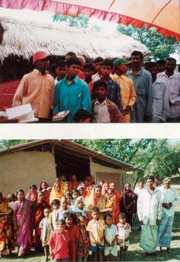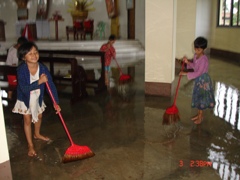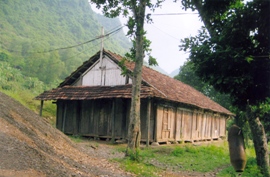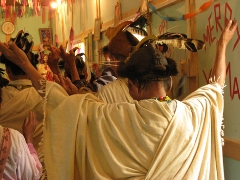|
The Church in Asia is growing but continues to face many challenges, including extreme poverty, natural disasters, repression and persecution. Intolerance, violence and government restrictions occur in Muslim, Buddhist, Hindu, and communist countries.
Christian Countries
 Located in Southwestern Asia between Turkey, Georgia, Azerbaijan and Iran, Armenia has a population that is almost entirely Christian (94.7% Armenian Apostolic, 4% other Christian, and 1.3% Yezidi). Catholics number some 250,000 of the nearly 3 million people in the country. Armenia became independent after the collapse of the Soviet Union, and a 1991 law established the separation of Church and State and the guarantee of religious freedom. The law also guaranteed the special status of the Armenian Apostolic Church, and all religious confessions must be registered with the government to worship freely; all proselytism is forbidden. A 1993 presidential decree imposed restrictions on religious confessions other than the Armenian Apostolic Church, limiting other religious confessions to internal activities. In 1998, the Parliament of Armenia again toughened restrictions, forcing other religious confessions to re-register with the government, only allowing confessions with more than 200 members, and only allowing adults to belong to other religious confessions. This legislation, which has seriously limited the religious freedom of minority groups, has been a source of tension for Catholic and Protestant groups. Located in Southwestern Asia between Turkey, Georgia, Azerbaijan and Iran, Armenia has a population that is almost entirely Christian (94.7% Armenian Apostolic, 4% other Christian, and 1.3% Yezidi). Catholics number some 250,000 of the nearly 3 million people in the country. Armenia became independent after the collapse of the Soviet Union, and a 1991 law established the separation of Church and State and the guarantee of religious freedom. The law also guaranteed the special status of the Armenian Apostolic Church, and all religious confessions must be registered with the government to worship freely; all proselytism is forbidden. A 1993 presidential decree imposed restrictions on religious confessions other than the Armenian Apostolic Church, limiting other religious confessions to internal activities. In 1998, the Parliament of Armenia again toughened restrictions, forcing other religious confessions to re-register with the government, only allowing confessions with more than 200 members, and only allowing adults to belong to other religious confessions. This legislation, which has seriously limited the religious freedom of minority groups, has been a source of tension for Catholic and Protestant groups.
In Georgia, a country of just over 4.63 million bordering Russia, Turkey, Armenia, and Azerbaijan, Catholics suffered greatly under Communist rule and now number only about 50,000. While religious freedom is guaranteed by law, the activities of religious groups other than the Georgian Orthodox Church (83.9% of the population) are limited. There are also communities of Muslims (9.9%) and Armenian-Georgians (3.9%). It is estimated that more than 2,000 Georgians have died from Russia's recent incursion into Georgian territory, and the area is in need of humanitarian assistance.
Muslim Countries
In many Muslim-majority countries, such as Afghanistan, Pakistan, and Bangladesh, the Church is a poor minority struggling for a place in a large, Muslim society where Islam is the state religion. In Pakistan, for example, the Constitution states that Islam must be the basis for all legislation and all Pakistani citizens must live according to Muslim principles. Legal discrimination against Christians is common, as is violence and other forms of social pressure.
 In Afghanistan, Islam is also the state religion, and while Christians are guaranteed the right to worship by the Constitution, decades of war and years of Taliban rule have left democratic institutions and judicial systems weak, leading to a climate of intolerance which can manifest in harassment and violence against both moderate Muslims and religious minorities. Conversion from Islam can still be taken as a great offense against Islam, punishable by death under Sharia law. In Afghanistan, Islam is also the state religion, and while Christians are guaranteed the right to worship by the Constitution, decades of war and years of Taliban rule have left democratic institutions and judicial systems weak, leading to a climate of intolerance which can manifest in harassment and violence against both moderate Muslims and religious minorities. Conversion from Islam can still be taken as a great offense against Islam, punishable by death under Sharia law.
In Bangladesh, Catholics are less than 1% of this mainly Muslim (83%) and Hindu (16%) country of over 150 million people. Here, too, Islam is the state religion, and while the state allows the practice of other religions, activities such as proselytism, while theoretically permitted, are discouraged by the government. In addition, while the state does not practice discrimination, cases of intolerance in society are frequent, and social discrimination against religious minorities is not uncommon, especially given that, apart from Hindus, religious minorities tend to be ethnic minorities as well. The extreme poverty that exists in the country also poses a serious problem for the Christian community.
 Other Muslim majority countries include Indonesia, where Christians make up over 8% of the population while Muslims make 90% and where local restrictions on religious activities are becoming more and more frequent. In Turkmenistan, Bibles and other religious literature are confiscated and the Church must limit its pastoral activities to serving foreign expatriates. In Maldives, all religious confessions other than Sunni Islam are forbidden, and other religions may be practiced only by visitors in private. Other Muslim majority countries include Indonesia, where Christians make up over 8% of the population while Muslims make 90% and where local restrictions on religious activities are becoming more and more frequent. In Turkmenistan, Bibles and other religious literature are confiscated and the Church must limit its pastoral activities to serving foreign expatriates. In Maldives, all religious confessions other than Sunni Islam are forbidden, and other religions may be practiced only by visitors in private.
Buddhist Countries
 In Buddhist countries, Christians also face discrimination, violence, prejudice, and government restrictions. In Burma/Myanmar, where the Catholic population of 4% exists in a majority Buddhist society (85%), a military dictatorship exists that in theory allows religious activity as long as a religious confession is registered with the government. In practice the government closely monitors religious activities and engages in severe religious discrimination. As a result, Buddhism functions as a de facto state religion, and the government favors Buddhist activities and restrains those of other communities. Obtaining permission to build churches, for example, is very difficult, and foreign missionaries are forbidden. The government also uses the media to turn the population against Christians and does not allow Christians to work in government positions. There have also been cases of soldiers destroying Christian churches and attempting to force Christians to convert to Buddhism. The Catholic community suffered as well from Hurricane Nargis, which struck in May of 2008, leaving over 1.5 million people homeless and badly damaging a local cathedral and numerous churches and convents. In Buddhist countries, Christians also face discrimination, violence, prejudice, and government restrictions. In Burma/Myanmar, where the Catholic population of 4% exists in a majority Buddhist society (85%), a military dictatorship exists that in theory allows religious activity as long as a religious confession is registered with the government. In practice the government closely monitors religious activities and engages in severe religious discrimination. As a result, Buddhism functions as a de facto state religion, and the government favors Buddhist activities and restrains those of other communities. Obtaining permission to build churches, for example, is very difficult, and foreign missionaries are forbidden. The government also uses the media to turn the population against Christians and does not allow Christians to work in government positions. There have also been cases of soldiers destroying Christian churches and attempting to force Christians to convert to Buddhism. The Catholic community suffered as well from Hurricane Nargis, which struck in May of 2008, leaving over 1.5 million people homeless and badly damaging a local cathedral and numerous churches and convents.
In Cambodia, where Christians are only 0.5% of the population, the Catholic presence was almost completely destroyed in the 1970’s and 80’s as a result of the genocide under the Communist Khmer Rouge, when at least 1.5 million people died from execution, forced hardships or starvation; and as a result from a civil war that began with a Vietnamese invasion and occupation, and lasted almost 13 years. The situation has improved recently, and the 1989 Constitution guaranteed religious liberty even as it declared Buddhism to be the religion of the State. Religious liberty was severely restricted, however, in all areas under the control of the Khmer Rouge, who finally collapsed in 1998. Local Buddhists, claiming that they are not respected by Christians, have also been known to demolish and burn Christian houses while shouting “Long live Buddhism” and “Destroy the Christians.”
 Other Buddhist-majority countries include Laos, Mongolia, and Thailand, as well as Singapore, where Buddhists, Taoists, Confucians, and Hindus are privileged by the government, and Sri Lanka and Vietnam, where Jesuits are not allowed to bring in foreign religious workers and where Christians face violence and social pressure. Other Buddhist-majority countries include Laos, Mongolia, and Thailand, as well as Singapore, where Buddhists, Taoists, Confucians, and Hindus are privileged by the government, and Sri Lanka and Vietnam, where Jesuits are not allowed to bring in foreign religious workers and where Christians face violence and social pressure.
Communist Countries
In Communist countries, such as China and North Korea, the Church faces persecution and government restrictions.
 While the Church in China is growing, it still remains a minority of just over 1%. Similar to other Asian countries, the Constitution of China guarantees religious liberty, but all religious communities must be registered with the government, which controls all religious activities. Christians are not allowed to join the Communist Party in power, and so Christians cannot work in a variety of government positions. Foreign missionaries are also forbidden. Some provinces also have local laws that are more restrictive than those of the central government, and in these areas the Church is isolated and repressed, in part by not being allowed to register with the government or by other restrictive measures. While the Church in China is growing, it still remains a minority of just over 1%. Similar to other Asian countries, the Constitution of China guarantees religious liberty, but all religious communities must be registered with the government, which controls all religious activities. Christians are not allowed to join the Communist Party in power, and so Christians cannot work in a variety of government positions. Foreign missionaries are also forbidden. Some provinces also have local laws that are more restrictive than those of the central government, and in these areas the Church is isolated and repressed, in part by not being allowed to register with the government or by other restrictive measures.
There are no reliable statistics on the Church in North Korea, where a strict, orthodox Marxist stance is taken against all religions. Persecution against Christians takes place in spite of government guarantees of religious freedom, even if, for propaganda purposes, the government allowed the building of a Catholic church and two Protestant churches in the late 1980’s.
Hindu Countries
 In India, Christians make up 2.5% of the population, while Hindus are the vast majority (80.5%). Religious freedom is technically guaranteed by the Constitution, but in fact there are restrictions and visas for foreign missionaries are refused. The Hindu BJP party in power has not modified the government’s official commitment to religious liberty, but the party has not been forceful in prosecuting cases of violence against Christians and Muslims. Christians are sometimes caught up in violence between Hindus and Muslims, but direct attacks against Christians occur as well. Attacks are sometimes accompanied by accusations that Christians are attempting to convert Hindus, and anti-conversion laws have been passed in certain areas. In some cases the government has moved to confiscate land owned by the Church and restrict the purchase of new land. In India, Christians make up 2.5% of the population, while Hindus are the vast majority (80.5%). Religious freedom is technically guaranteed by the Constitution, but in fact there are restrictions and visas for foreign missionaries are refused. The Hindu BJP party in power has not modified the government’s official commitment to religious liberty, but the party has not been forceful in prosecuting cases of violence against Christians and Muslims. Christians are sometimes caught up in violence between Hindus and Muslims, but direct attacks against Christians occur as well. Attacks are sometimes accompanied by accusations that Christians are attempting to convert Hindus, and anti-conversion laws have been passed in certain areas. In some cases the government has moved to confiscate land owned by the Church and restrict the purchase of new land.
 A particularly violent attack against Christians occurred over three and a half days in 2007 during the Christmas season in the state of Orissa in the northeast of India. Nine Christians were killed, 90 churches were burned, 600 homes were destroyed, and thousands lost their homes and belongings as they were forced to flee their villages into the forest. In many of the villages, police and firefighters did not intervene to stop the rioting of the Hindu extremists. Violence against Christians broke out again in the summer of 2008 after the killing of a Hindu religious leader, Swami Laxmananda Saraswati, who had opposed conversions to Christianity. While Maoist rebels claimed responsibility, Hindu radicals blamed local Christians and began a series of attacks, beginning in Orissa but spreading to other areas of India. Thousands of Christians were forced to flee their homes in the ensuing violence, which left over 30 dead. During the attacks, hundreds of Christian homes and shops were destroyed, along with over 70 churches and other institutional buildings. Clergy were singled out for attack, and two nuns were gang-raped in separate incidents. A particularly violent attack against Christians occurred over three and a half days in 2007 during the Christmas season in the state of Orissa in the northeast of India. Nine Christians were killed, 90 churches were burned, 600 homes were destroyed, and thousands lost their homes and belongings as they were forced to flee their villages into the forest. In many of the villages, police and firefighters did not intervene to stop the rioting of the Hindu extremists. Violence against Christians broke out again in the summer of 2008 after the killing of a Hindu religious leader, Swami Laxmananda Saraswati, who had opposed conversions to Christianity. While Maoist rebels claimed responsibility, Hindu radicals blamed local Christians and began a series of attacks, beginning in Orissa but spreading to other areas of India. Thousands of Christians were forced to flee their homes in the ensuing violence, which left over 30 dead. During the attacks, hundreds of Christian homes and shops were destroyed, along with over 70 churches and other institutional buildings. Clergy were singled out for attack, and two nuns were gang-raped in separate incidents.
In Nepal, where Christians are only 1.6% of a majority Hindu (81.5%) and Buddhist (15.8%) country, the Church’s growth has suffered from the ravages of war, political and ethnic conflicts, human trafficking, and other social and economic issues. Proselytism and conversion are forbidden and punished with prison sentences. Attacks against Christians do occur, such as a 2004 attack against a Catholic school by Maoist rebels who robbed the school at gunpoint and then set off a bomb which destroyed the school office and half of the classroom space, causing over $1.5 million in damages. It was the third attack on the school since 1994.
Primary source for population and religion estimates: http://www.cia.gov/
Return to The Suffering Church Worldwide
|

 Located in Southwestern Asia between
Located in Southwestern Asia between  In
In  Other Muslim majority countries include
Other Muslim majority countries include  In Buddhist countries, Christians also face discrimination, violence, prejudice, and government restrictions. In Burma/Myanmar, where the Catholic population of 4% exists in a majority Buddhist society (85%), a military dictatorship exists that in theory allows religious activity as long as a religious confession is registered with the government. In practice the government closely monitors religious activities and engages in severe religious discrimination. As a result, Buddhism functions as a de facto state religion, and the government favors Buddhist activities and restrains those of other communities. Obtaining permission to build churches, for example, is very difficult, and foreign missionaries are forbidden. The government also uses the media to turn the population against Christians and does not allow Christians to work in government positions. There have also been cases of soldiers destroying Christian churches and attempting to force Christians to convert to Buddhism. The Catholic community suffered as well from Hurricane Nargis, which struck in May of 2008, leaving over 1.5 million people homeless and badly damaging a local cathedral and numerous churches and convents.
In Buddhist countries, Christians also face discrimination, violence, prejudice, and government restrictions. In Burma/Myanmar, where the Catholic population of 4% exists in a majority Buddhist society (85%), a military dictatorship exists that in theory allows religious activity as long as a religious confession is registered with the government. In practice the government closely monitors religious activities and engages in severe religious discrimination. As a result, Buddhism functions as a de facto state religion, and the government favors Buddhist activities and restrains those of other communities. Obtaining permission to build churches, for example, is very difficult, and foreign missionaries are forbidden. The government also uses the media to turn the population against Christians and does not allow Christians to work in government positions. There have also been cases of soldiers destroying Christian churches and attempting to force Christians to convert to Buddhism. The Catholic community suffered as well from Hurricane Nargis, which struck in May of 2008, leaving over 1.5 million people homeless and badly damaging a local cathedral and numerous churches and convents.  Other Buddhist-majority countries include
Other Buddhist-majority countries include  While the Church in
While the Church in  In
In  A particularly violent attack against Christians occurred over three and a half days in 2007 during the Christmas season in the state of Orissa in the northeast of
A particularly violent attack against Christians occurred over three and a half days in 2007 during the Christmas season in the state of Orissa in the northeast of